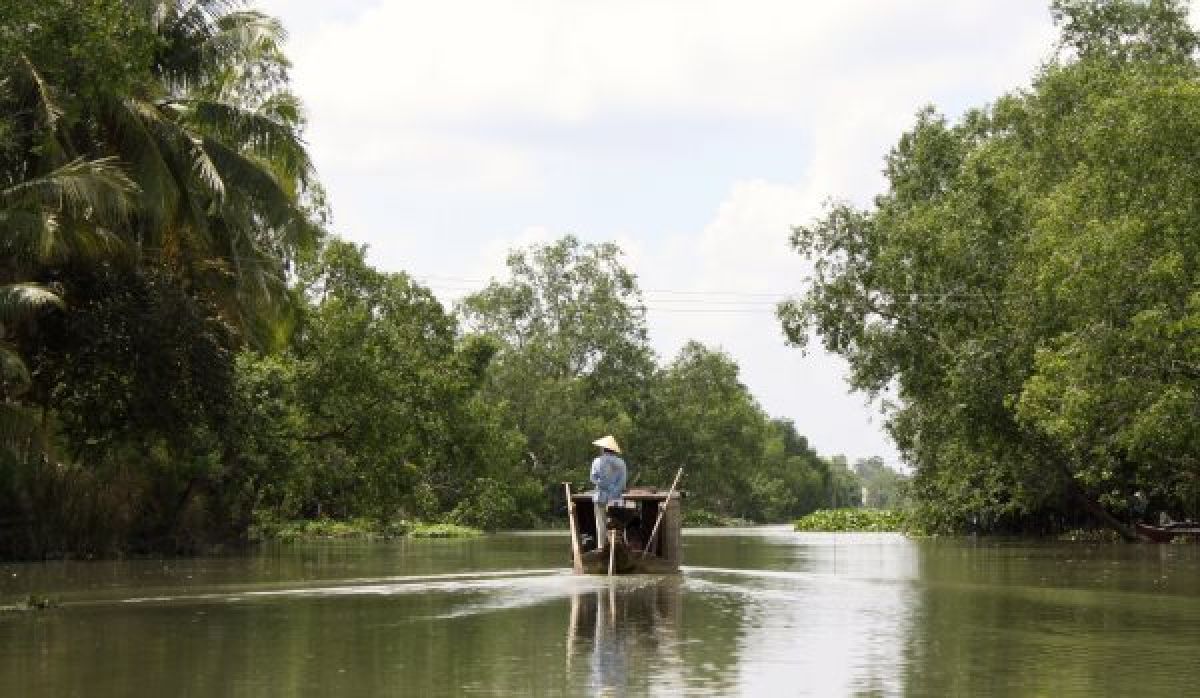
Why did you decide to move to Vietnam?
The first time I moved to Vietnam, it was to become one of the first Americans since the end of the war to live and work here. I was 24 and the idea of an adventure in a country few people really knew anything about appealed to me. I had a singular, life-shaping experience here, and even after I decided to leave to pursue a new life elsewhere, after a year away I found myself having recurring dreams about Vietnam and desperately missing it - the people, the place itself, and the lifestyle I had. Many of my returns to Vietnam have also been motivated by a desire to write.
How was the moving process?
Moving here has never been difficult. I have few possessions, and whenever I move to Vietnam I usually just bring two large suitcases, a backpack, and I mail to a friend's address here two or three boxes of clothes and books. Only once have I had a problem with moving. In 2011 when I moved from Akita, Japan, to Vietnam, one box I mailed was confiscated and never returned, though all it contained were personal, handmade gifts my Japanese students and friends had made for me.
What were the formalities you had to undergo in order to be able to live in Vietnam?
The most important thing has always been having a long-term visa. It wasn't long ago when you could go to any agency and pay a few hundred dollars for a one-year multiple entry visa. Now, however, getting a visa is more complicated. These days I come into the country with a three-month multiple entry visa and extend it whenever I need to. Supposedly you can only extend it three times before having to leave the country, but I'm now in the process of getting my fifth. Other than that, it's important to get proper vaccinations before arriving, and it's probably worthwhile to get a complete medical checkup before moving here, too. Medical care in Vietnam still isn't of an international standard, so if you have any health concerns it's better to have a care or treatment plan prior to arriving.
Did you have to find a job and how did you proceed?

The first two times I came to Vietnam my work was prearranged. After that I simply came on my own and found work wherever I could. The best situation I had was when I was teaching online for a US university. My salary was good, my hours were flexible, and I had as much mobility in Vietnam as I needed. All I had to do on those occasions was choose where I wanted to live. Although the visa situation is getting stricter, until just a few years ago it was never an issue.
How about your accommodation search?
The first two times I lived in Vietnam, the schools where I taught provided me with on-campus accommodation. After that, whenever I moved to Vietnam I'd stay in cheap hotels for one or two days as I looked for a place to live - either through friends' recommendations, rental agencies I knew of, or signs posted on the street. The Internet has become a great resource for finding accommodations in Vietnam. Starting a conversation with other expats is another good way - accommodation tends to be a popular conversation topic for many.
Did you face difficulties to adapt to your host country (language, culture, do's and don'ts)?
I never really faced any difficulties adapting to Vietnam. The language was difficult at first, but I was lucky in that it came to me pretty quickly. I put a fair bit of time into it the first couple of years through self-study, and I always found chances to use it, which is really important. There are certain frustrations here, of course, like bad traffic, noise, being stared at, bouts of food poisoning, etc. But those frustrations come and go. Vietnam offers more than enough to compensate for them!
What surprised you the most in Vietnam?
When I first came here back in 1994, it was the friendliness of the people, and the lack of anger or resentment toward me as an American, that surprised me the most. Now, it's the fast pace and enormity of change in the country. Vietnam today is like a different planet compared to 20 years ago.
Is it easy to meet new people in Vietnam? Any advice to share with the other members?
The ease of meeting new people is one of the great things Vietnam offers. Knowing even just a kernel or two of the language helps enormously when trying to engage with local people. As for expats in Vietnam, I generally find them open, friendly, and approachable. There are the obvious venues like bars and cafes in which to meet new people, but there are also sports clubs and dance classes and even dog-walking groups that make this easy - much easier than in the US.
Could you please share with us something you like about Vietnam and something you don't like?
One of the things I like about Vietnam is the pace of life. In the countryside and the smaller cities of Vietnam, people seem content to take life as it comes rather than force it to unfold whenever it pleases them. Big cities like HCMC and Hanoi have an energy that feels as if it can't be slowed down or avoided, but there are always pockets where one can relax and even get a feeling for the past, when the cities weren't so chaotic and sprawling. And the countryside is never far away. If you have a motorbike, you can quickly get outside the cities to where it offers one a sense of truly being in Vietnam. It's always possible to slow down there and regain your bearings. One thing I don't like is the lack of government oversight over food production. One increasingly has to be vigilant about where one's food comes from and what kind of chemicals and fertilizers have been used to grow and preserve it. Vietnamese food is traditionally very healthy, but over the long term I've begun to worry about what I'm ingesting here.
A common belief about Vietnam which wasn't right:
The country is a dangerous place for foreigners because of its system of government and the wars it fought last century. The fact is that Vietnamese people are incredibly peace-loving, and the country is very open to and welcoming of foreigners.
What do you miss the most from the US, your home country?
This may just be me, but I've always missed English-language bookstores, the kind where you can spend an entire afternoon happily getting lost. I also miss being able to walk where I want to go. In the US, distances are usually too far to travel on foot, but at least the sidewalks are reserved for pedestrians and it's safe to walk there. Most of all, though, I miss nature and open spaces.
What does your typical day as an expat in Saigon look like?

When I first moved to Saigon my typical day involved teaching online for a university in the US; going to cafes to write, read, and study Vietnamese language flashcards I'd made; exercising at a hotel gym; and seeking new travel and culinary adventures and blogging about them. I don't know how many miles I put on my motorbike exploring the city, but it was a lot. Now, however, I'm focused on my writing and I spend most of my time here doing that. I freelance when I can, and I also have my hands full with two cats we rescued off the street.
What do you do in your spare time?
I've become a great bore to many of my friends here. I write, read, play with my cats, hang out with my girlfriend, and walk in the evenings along the river. I also plan amazing trips that too often fail to materialize.
How is the Vietnamese lifestyle?
Fantastic. It's always been one of the most appealing aspects of being here. Vietnam remains very affordable, especially to the struggling writer, and travel options are increasing and improving all the time. Another thing I love about Vietnam are its cafes. Coffee here is cheap and delicious, and cafes often have a lush and exotic air to them, plus they're everywhere you can imagine. They're perfect for writers to dream and work in.
Have you adopted any Vietnamese habit since living here?
Very bitter coffee cut with obscene amounts of sweetened condensed milk. And a certain insouciance about life that might raise eyebrows in the US.
You recently published a fictional book, Lotusland, which takes place in Vietnam: why did you choose to set your novel there and how did your own experience in the country influence you?
I set Lotusland in Vietnam for a number of reasons. One is that writing about Vietnam allows me to delve deeper into my experiences here and make sense of them. The second is that almost no other novels about contemporary Vietnam are being published in the U.S. Publishers seem only to want novels and memoirs about the war here. I wanted to write about Vietnam as it is today while telling a story from an expat's perspective, but I also wanted to share with readers aspects of Vietnamese culture - from the beautiful traditions of Vietnamese lacquer art, to various parts of the country I've come to know, to the horrible legacy of Agent Orange that continues to affect thousands of lives in Vietnam. While my characters are completely invented, there are instances in the book where I've fictionalized things that have happened to me and to people I've known here. This, I think, makes the novel authentic and therefore of particular interest.
Which advice would you give to people wishing to live in Vietnam?
Don't let anything hold you back if living in Vietnam is what you want to do. I've made the move here seven times now. If you're single and unencumbered, it's as easy as buying a ticket, arranging a visa, packing your bags, and coming here. Living overseas doesn't have to be difficult. Once you're here, it's easy to stay. You just have to decide if Vietnam is right for you.



















